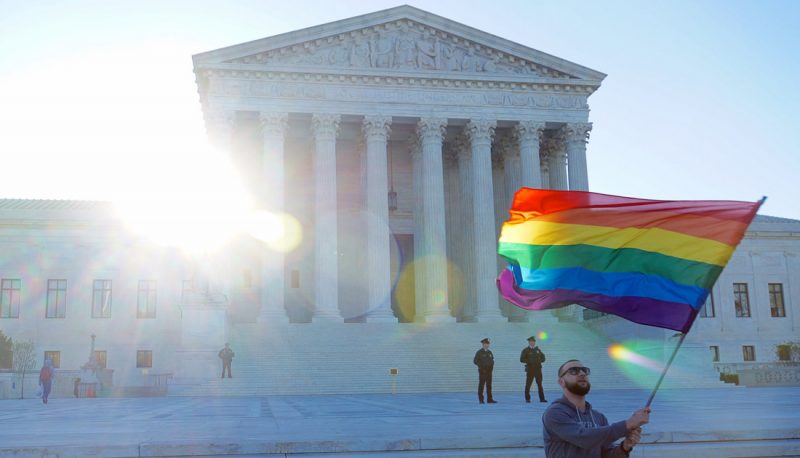The Religious Right was hoping that the Masterpiece Cakeshop case would dramatically further their efforts to portray LGBTQ equality as inherently inconsistent with religious liberty. They also hoped it would advance their long-term effort to transform religious liberty from a shield designed to protect rights into a sword designed to strip others of their rights. But while the Supreme Court ruled for the anti-equality baker in this case, it did so very narrowly, denying the Right the smashing victory they’d hoped for.
Alliance Defending Freedom (representing baker Jack Phillips) argued that:
- Baking wedding cakes makes Phillips an active participant in his customers’ weddings, even though he is not present and is not even invited. Therefore, requiring him to make a wedding cake for a ceremony he opposes on religious grounds forces him to engage in a religious activity in violation of his constitutional right to the free exercise of religion.
- Designing a wedding cake is recognized as a public declaration of the baker’s support for the ceremony. Therefore, anti-discrimination laws compel speech he disagrees with, in violation of his free speech rights.
- More generally, the Religious Right saw this case as a weapon to weaken anti-discrimination laws. Essentially, they argued that merchants have a constitutional right to engage in otherwise illegal discrimination under the Free Exercise Clause as long as they cite their sincere religious beliefs as justification.
Fortunately, Justice Kennedy’s majority opinion for the 7-2 Court gave them none of that. The five conservatives, joined by Justices Breyer and Kagan, declined to rule on ADF’s expansive arguments, but clearly recognized the impact of the ruling ADF was seeking:
[A]ny decision in favor of the baker would have to be sufficiently constrained, lest all purveyors of goods and services who object to gay marriages for moral and religious reasons in effect be allowed to put up signs saying “no goods or services will be sold if they will be used for gay marriages,” something that would impose a serious stigma on gay persons.
The justices noted that constitutionally protected religious activities and beliefs do not automatically trump anti-discrimination under the Constitution:
The Court’s precedents make clear that the baker, in his capacity as the owner of a business serving the public, might have his right to the free exercise of religion limited by generally applicable laws.
But the Court avoided the general issues by instead focusing on the proceedings in this particular case.
The majority was especially bothered by this statement by a member of the Colorado Civil Rights Commission during administrative consideration of the discrimination complaint:
Freedom of religion and religion has been used to justify all kinds of discrimination throughout history, whether it be slavery, whether it be the holocaust, whether it be—I mean, we—we can list hundreds of situations where freedom of religion has been used to justify discrimination. And to me it is one of the most despicable pieces of rhetoric that people can use to—to use their religion to hurt others.
The Court condemned this as constitutionally impermissible anti-religious bias by the state:
To describe a man’s faith as “one of the most despicable pieces of rhetoric that people can use” is to disparage his religion in at least two distinct ways: by describing it as despicable, and also by characterizing it as merely rhetorical—something insubstantial and even insincere. The commissioner even went so far as to compare Phillips’ invocation of his sincerely held religious beliefs to defenses of slavery and the Holocaust. This sentiment is inappropriate for a Commission charged with the solemn responsibility of fair and neutral enforcement of Colorado’s anti-discrimination law—a law that protects discrimination on the basis of religion as well as sexual orientation.
This was an important part of the majority’s reasoning that led them to determine that Colorado had violated Phillips’ free exercise rights.
Significantly, this narrow, case-specific opinion reaffirmed the importance of anti-discrimination laws, including those protecting LGBTQ people from discrimination. The majority opinion’s analysis begins on that note:
Our society has come to the recognition that gay persons and gay couples cannot be treated as social outcasts or as inferior in dignity and worth. For that reason the laws and the Constitution can, and in some instances must, protect them in the exercise of their civil rights. The exercise of their freedom on terms equal to others must be given great weight and respect by the courts.
Elsewhere in the opinion, the justices state:
The outcome of cases like this in other circumstances must await further elaboration in the courts, all in the context of recognizing that these disputes must be resolved with tolerance, without undue disrespect to sincere religious beliefs, and without subjecting gay persons to indignities when they seek goods and services in an open market.
Future litigants may point to that language as supporting the argument that protecting LGBTQ people from discrimination and indignity in the marketplace is a compelling state interest. That could make such laws more able to withstand challenges from equality opponents on both the state and federal level.
That’s not exactly the outcome the Religious Right has been working for. No doubt, however, they will continue to spin the decision as a major victory and will try to use it as a means for challenging other states’ enforcement of nondiscrimination laws. Other cases involving religious and free speech objections to nondiscrimination laws are working their way through the federal courts, which will hopefully reject them as long as religious objections are treated with respect.

